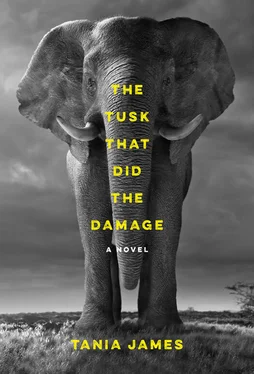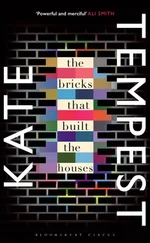“Good,” said Jayan, and to me: “We will save you a seat.”
By “seat,” he meant a sliver of space in a mini-lorry that pummeled my hind parts for most of the five-hour journey. All throughout Raghu asked questions about hunting and guns as if studying for a job interview. Jayan told of the time he went for a five-day hunt and found himself having to eat a dinner of boiled black monkey. “I begged them to cut off the head before cooking it, but they said the brain was the best part.” Jayan shook his head. “All curled up and tail cut. Looked just like a baby boiling in a pot.”
Not a second too soon we reached Communist Chacko’s house, a stucco hulk with stone dolphins on the gateposts. Raghu thought it all folly and waste (“What is the point? A house can’t feed a man”), but Jayan told him to shut up and say nothing until we were back on the road.
Communist Chacko had been trained as a lawyer — he always attached “Esq.” to the tail of his signature — but he was the picture of a politician with that smile, as slick and white as his marble floor. Framed photos claimed every wall, his sons Lenin and Stalin featured in most. The boys were poor in school but no matter, said Communist Chacko, Lenin-Stalin would follow him into the family business. Names like theirs they wouldn’t find a job that easy. The names had been Dolly’s idea. His wife’s people were total Marxists. Communist Chacko didn’t mind. “You know the best part of being a Marxist? You don’t have to go to church.” For one who never went to church, the man liked to preach.
Communist Chacko led us out the back door, bypassing a shed that hummed with machinery. At the foot of a steep metal staircase, he kicked up his mundu and squinted at the summit. “Come. The birds are waiting.”
What the hell kind of code was he speaking? Were “the birds” his associates awaiting us in that tarp-lined chamber on the roof? I was the last to clang up the wobbly rungs and emerge into a small space that contained Communist Chacko, Jayan, Raghu, and seven wire cages of fowl.
There were two to each cage, husband and wife, most of them feathered in red, yellow, and green. Communist Chacko puckered his lips at a nearby parrot, who clung to the wire with dainty taloned feet. He raised a fingertip to its beak; the parrot bit gently and released. “She’s a sweet one,” said Communist Chacko. “The others will snip your switch off.”
“What are they for?” Raghu whispered to me.
“Breeding and selling,” said Communist Chacko. “You should see the cockatoos mate, it’s quite charming.”
I would have sooner watched a dog make turds, but in the spirit of pleasing our host, I peered into a cage of small parakeets. Four whites and two grays flicked their necks this way and that.
“I had a macaw,” Communist Chacko said wistfully. “He flew off. Can you imagine — watching one whole lakh dissolve into blue sky?”
“Maybe not a whole lakh,” said my brother. “But I know what it is to lose hard-earned money.”
Communist Chacko grinned at one of the switch-snippers. “You had a falling-out with Babu.”
“He takes too great a cut and for what? For his car? We have a mini-lorry.”
“Yes, I saw. Not the most inconspicuous vehicle.” The fat man gazed into another cage, where a diseased-looking parakeet perched alone, ragged and balding in patches, eyes like milky bulging marbles. It held itself perfectly still, wings folded tight around a tortured heart.
“He is inconsistent,” my brother went on. “Haggling like a fishmonger, wasting my time. And who is he to judge the grade? The man has cataracts for god’s sake.”
Communist Chacko sighed as if all this backbiting were undignified. His breath ruffled the blind bird’s breast.
“Will it die?” I asked, forgetting my brother’s no-talk policy. He gave me a look that said he would bury me in my books.
“Fairly soon I would think,” said Communist Chacko. “Do you like animals?”
“None I would like to see mating.”
Communist Chacko laughed. “I am not a sentimental person, you know. If you told me tomorrow their feathers were precious in China, I would be out here plucking the lovelies myself.” Communist Chacko stepped back from the cages and resumed his preacher voice: “And God said unto Man, Be fruitful and multiply and have dominion over the fish of the sea and over the fowl of the air and over every living thing that moves upon the earth.” Raghu nodded along like a born-again.
“OK, do this,” said Communist Chacko. “Deliver the tusks directly to me. I will give you two thousand more per kilo. But this is on a one-month trial basis only. Any little problem and we go back to the old way.”
After taking specific directions on protocol — where to drop off and when and to whom — we left the preacher to his fowl and emerged into the swollen heat. I trotted down the last few steps, somehow uplifted by my brother’s success and my hand in it. And perhaps I would have forgotten all about the shed had it not shrieked at me as I passed. My brother and cousin walked ahead, unhearing. The door was ajar.
How well I recall the world in that narrow room. Two long tables covered in a forest of white figurines. A troop of tiny elephants. Bangles smooth and stacked. And in the far corner a giant Nataraj with one sleek limb raised, all in ivory.
Several craftsmen sat at the tables, some carving with awls fine as a sparrow’s claw. A man ground a piece against a whetstone. A young boy went from table to table, using a careful cupped hand to sweep ivory shavings into a bag.
“We sell them to Ayurvedic doctors,” Communist Chacko said, causing my heart to jump. “Little ivory powder and coconut oil could do wonders for your dandruff.”
“I do not have dandruff.”
“Then I suppose that shit on your shoulder is snow.”
As I brushed at my shirt, I could feel his eyes on me, narrowing.
“You are a curious fellow, aren’t you?” he said.
“Sorry, sir, the door was open—”
“Oh, I don’t care. I have a license. Got it ten years before the ban, luckily.”
“So the Forest Department looks the other way?”
“Depends on who is doing the looking.” He pointed to a pair of tusks on a nearby table. “Those are for P. K. Kurian, the divisional range officer before that lardy little Muslim took over. She’s a tough one. Have you met her?”
“No.”
Communist Chacko ushered me out of the shed, closing the door. “Count yourself lucky.”
So every other month Jayan and his fat-necked associate drove their spoils to Kottayam and I returned to my studies quite happily. I was only fifteen years old, yet I had mapped the course of my life — to do my pre-degree in Commerce and attend college and someday be chief manager of a bank, with my own glass-walled office where visitors had to wait their turn. Jayan may have been our lifeboat in those days, but I would build a great ship of myself. I would keep the sea so calm my mother would hardly feel it shift beneath her feet.
But ships take a long time to build, much longer than it takes to build a dream. In the meantime Jayan would give her no peace.
One dull gray morning, the mini-lorry came up the road and stopped before our house. My brother stepped out, followed by a woman who kept her apologetic gaze on the ground.
She had dainty toe rings on each of her dusty feet, the sort of ornament that seemed to me both ridiculous and intriguing. I tried not to look too hard at her face, at the lashes that grazed her cheeks. I tried to appear calm when Jayan introduced her as his wife. Leela. A woman he had found and then married in a Kottayam courthouse.
Oh, the fit my mother threw. How could Jayan do such a thing? Elope with some Christian no-name without even a hello-goodbye to his mother? What kind of loose shameless beef-eating she-dog would run off with a Hindu, no engagement, no dowry, no nothing? (The indecent kind, that’s what — the taking-advantage kind!) And why did Jayan think the beef-eater would never run from him?
Читать дальше












